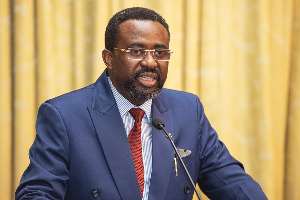
Dr. Johnson Pandit Asiama, the Governor of the Bank of Ghana, has laid out four fundamental principles to alter trade relations between the United States and Africa from a limited exchange of goods to a strong alliance of jointly generated wealth.
In his keynote speech at the African Leaders & Partners Forum in Washington, D.C., on Tuesday, April 22, Dr. Asiama urged business executives and policymakers to focus on a new framework based on strategy, equity, and shared vision rather than aid and transactional trade.
“For this partnership to truly deliver, we must shift our focus—from narrow deals to shared direction. From isolated transactions to long-term frameworks. And from extractive exports to value-added integration,” he said.
The Governor’s call comes after he had raised concerns that, while African trade with the United States is increasing, it remains heavily concentrated in raw materials and primary commodities.
For example, in 2024, US-Africa trade reached $71.6 billion, but Nigeria’s exports were dominated by crude oil, while countries like as Côte d’Ivoire remained susceptible due to cocoa price instability.
Dr. Asiama advocated four pillars for reversing this trend: macroeconomic credibility and strategic autonomy, financial system resilience and risk mitigation, trade integration and financing, and inclusive digital transformation.
He highlighted that macroeconomic stability is the cornerstone for long-term involvement, but it must be combined with Africa establishing itself not only as a resource supplier, but also as a production partner.
“Strategic autonomy means we define our place in global trade—not as a resource depot, but as a production partner,” he stressed.
On financial resilience, he stated that Africa requires robust mechanisms that direct resources to productive areas.
He cited Ghana’s Financial Stability Fund, which was established with foreign partners, as a step toward improving trust and post-pandemic recovery.
The third pillar, deepening trade integration, aimed to remove financial impediments and reposition Africa as a hub for investment in agro-processing, manufacturing, and logistics.
“Africa is not short on opportunity. But we must now match ambition with the mechanisms to unlock it,” Dr. Asiama noted.
The last pillar, inclusive digital transformation, emphasizes the importance of empowering Africa’s youth through innovation.
He pointed out Ghana’s eCedi pilot as an example of how digital tools can protect sovereignty while expanding access.
Dr. Asiama also advocated for revisions to the African Growth and Opportunity Act (AGOA) and more US funding for infrastructure, trade finance, and green technology partnerships.


